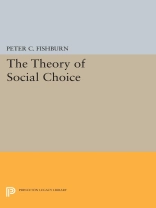One fundamental premise of democratic theory is that social policy, group choice, or collective action should be based on the preferences of the individuals in the society, group, or collective. Using the tools of formal mathematical analysis, Peter C. Fishburn explores and defines the conditions for social choice and methods for synthesizing individuals’ preferences. This study is unique in its emphasis on social choice functions, the general position that individual indifference may not be transitive, and the use of certain mathematics such as linear algebra.
The text is divided into three main parts: social choice between two alternatives, which examines a variety of majority-like functions; simple majority social choice, which focuses on social choice among many alternatives when two-element feasible subset choices are based on simple majority; and a general study of aspects and types of social choice functions for many alternatives.
Originally published in 1973.
The Princeton Legacy Library uses the latest print-on-demand technology to again make available previously out-of-print books from the distinguished backlist of Princeton University Press. These editions preserve the original texts of these important books while presenting them in durable paperback and hardcover editions. The goal of the Princeton Legacy Library is to vastly increase access to the rich scholarly heritage found in the thousands of books published by Princeton University Press since its founding in 1905.
Peter C. Fishburn
The Theory of Social Choice [PDF ebook]
The Theory of Social Choice [PDF ebook]
Buy this ebook and get 1 more FREE!
Language English ● Format PDF ● Pages 278 ● ISBN 9781400868339 ● File size 12.1 MB ● Publisher Princeton University Press ● City Princeton ● Country US ● Published 2015 ● Downloadable 24 months ● Currency EUR ● ID 5490932 ● Copy protection Adobe DRM
Requires a DRM capable ebook reader











